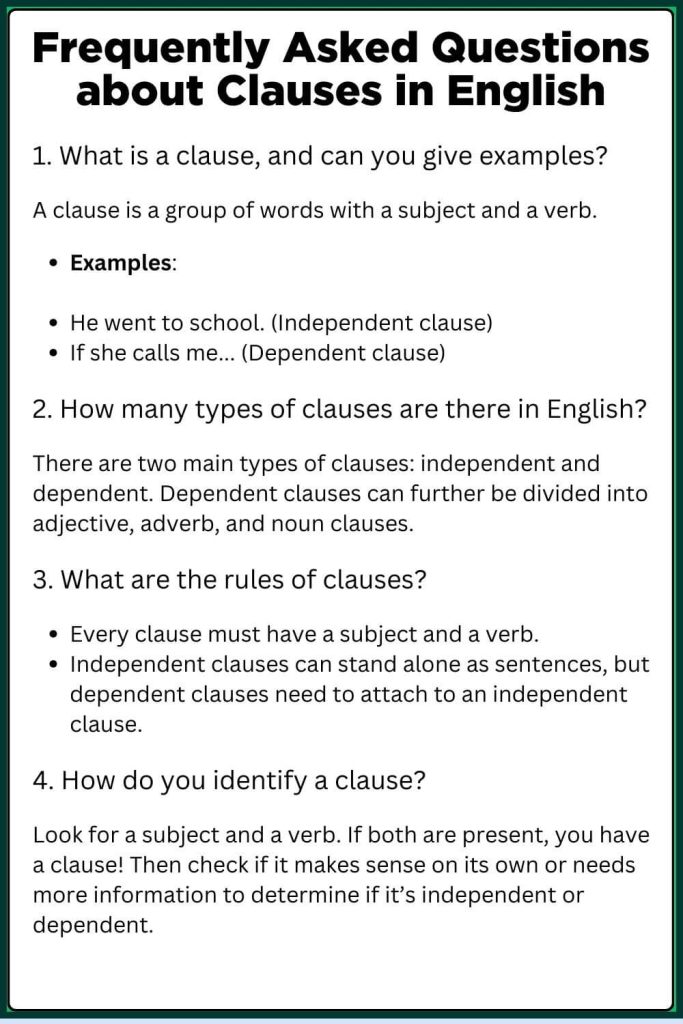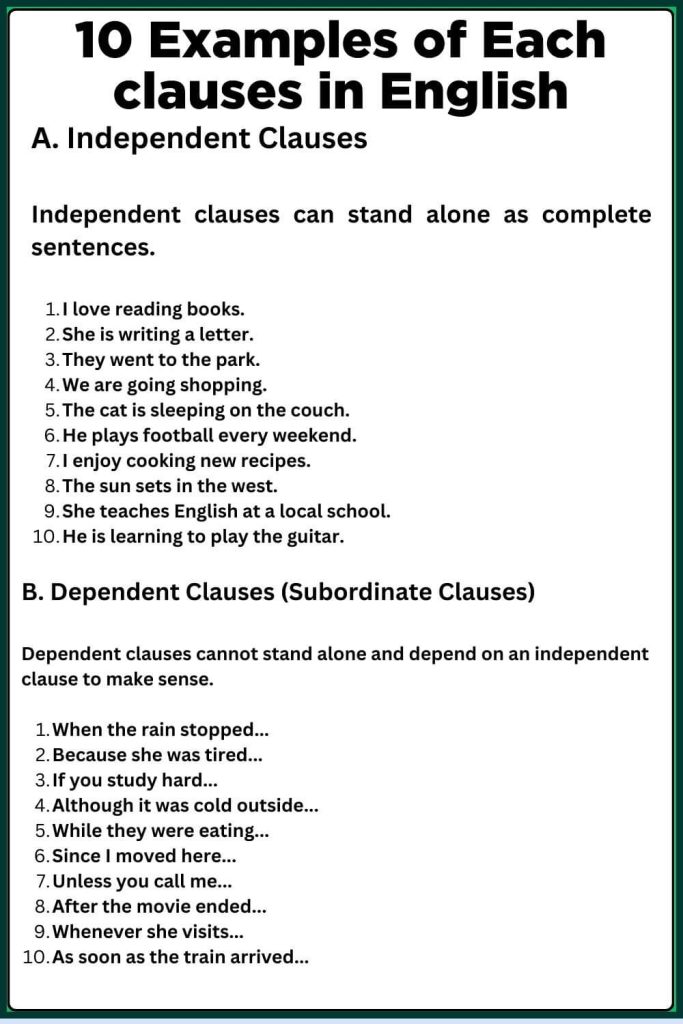Have you ever wondered how we form sentences in English? Sentences aren’t just random words strung together—they have structure! One of the most important building blocks of any sentence is a clause. Whether you’re a beginner or looking to refresh your knowledge, understanding clauses in English can dramatically improve your English grammar skills.
What is a clause?
A clause is a group of words that contains a subject and a verb. It expresses an idea and forms the backbone of any sentence. Clauses can be simple, like a short statement, or more complex, adding details and meaning to sentences.
For example:
- I ate breakfast.
Not every group of words is a clause! For a clause to exist, there must always be both a subject and a verb.
Types of Clauses in English
There are two main types of clauses in English:
1. Independent Clauses
An independent clause is a complete thought. It can stand alone as a sentence.
- Example: She is reading a book.
Features:
- Have a subject and a verb.
- It stands alone as a complete thought
2. Dependent Clauses (or Subordinate Clauses)
A dependent clause cannot stand alone. It depends on an independent clause to make sense.
- Example: When I was younger…
Features:
- Have a subject and a verb but doesn’t express a complete thought.
- Starts with subordinating conjunctions like because, if, when, although, or since.

10 Examples of Each clauses in English
A. Independent Clauses
Independent clauses can stand alone as complete sentences.
- I love reading books.
- She is writing a letter.
- They went to the park.
- We are going shopping.
- The cat is sleeping on the couch.
- He plays football every weekend.
- I enjoy cooking new recipes.
- The sun sets in the west.
- She teaches English at a local school.
- He is learning to play the guitar.
B. Dependent Clauses (Subordinate Clauses)
Dependent clauses cannot stand alone and depend on an independent clause to make sense.
- When the rain stopped…
- Because she was tired…
- If you study hard…
- Although it was cold outside…
- While they were eating…
- Since I moved here…
- Unless you call me…
- After the movie ended…
- Whenever she visits…
- As soon as the train arrived…

C. Adjective Clauses
Adjective clauses describe or give more information about a noun.
- The book that I borrowed was interesting.
- The girl who lives next door is very kind.
- The cake that you baked was delicious.
- The movie that we watched last night was exciting.
- The teacher who helped me was very patient.
- The house where I grew up is now a museum.
- The bag that is on the table is mine.
- The man whose car was stolen called the police.
- The city where they got married is beautiful.
- The dog that barked all night belongs to our neighbor.
D. Adverb Clauses
Adverb clauses explain when, why, how, or under what condition something happens.
- I went home because it was raining.
- She left early so that she could catch the train.
- We will go for a walk if the weather improves.
- When the alarm rang, he woke up.
- They were happy, although they lost the game.
- I will call you as soon as I finish work.
- He waited until the bus arrived.
- She cleaned the kitchen while her brother did the dishes.
- Before he left, he packed his bag.
- Since it was late, they decided to stay home.
E. Noun Clauses
Noun clauses function as subjects, objects, or complements within a sentence
- What she said surprised everyone.
- I don’t know where they went.
- Tell me what you want.
- It depends on how much you study.
- Do you remember why they left?
- She is worried about whether he’ll come.
- The fact that he passed the test made everyone happy.
- I don’t care what others think.
- Whoever wins the race will get a prize.
- I wonder if it will rain tomorrow.
Frequently Asked Questions about Clauses in English
1. What is a clause, and can you give examples?
A clause is a group of words with a subject and a verb.
- Examples:
- He went to school. (Independent clause)
- If she calls me… (Dependent clause)
2. How many types of clauses are there in English?
There are two main types of clauses: independent and dependent. Dependent clauses can further be divided into adjective, adverb, and noun clauses.
3. What are the rules of clauses?
- Every clause must have a subject and a verb.
- Independent clauses can stand alone as sentences, but dependent clauses need to attach to an independent clause.
4. How do you identify a clause?
Look for a subject and a verb. If both are present, you have a clause! Then check if it makes sense on its own or needs more information to determine if it’s independent or dependent.

Conclusion
Understanding clauses is so important when learning English. They form the foundation of sentence structure, allowing you to create more meaningful and complex sentences. Start by identifying clauses in simple sentences and then practice with complex ones. With time, you’ll master this essential skill!

